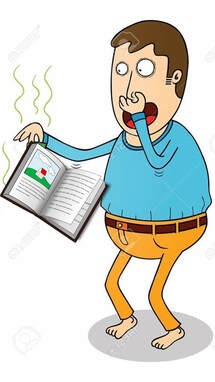 A while ago, in this very blog, I made an offer to review books for other authors. It was intended as an act of solidarity to undermine the leaches that are preying on the writing community by offering dubious quality services in exchange for even more dubious quality benefits - and all at a price. I should have thought it through a little bit more. It isn’t the work involved. If I was worried about that I would never have made the offer in the first place. No, it is that there are so very many poorly written books out there and when you make an offer to review books you have to read them first. The problem is quantity versus quality. There are more people writing books today than ever before. When Covid struck (and a recession earlier in the century), writing a book would seem like good way to generate a new income. The cost of entry into the market is as low as the price of a pencil and a notepad, though a computer of some sort makes life much easier. The truth is that very few authors make enough money to live on, but very few of these new authors would actually know that. 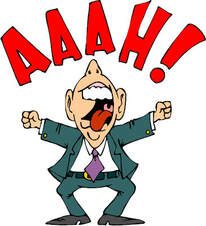 When satellite, cable and free to air digital TV came along I made a personal prediction that the quantity it offered would come at the cost of quality. It is a prediction that came true. While there are good quality programmes on some channels, once you get away from the big name providers you are into a world of repeats, reality TV and pseudo reality. Most of it fits neatly under the heading of "junk TV". The same applies to writing. Quantity comes at the expense of quality. Anyone who can write 80,000 words (it is frequently a lot less) can click on the “upload” button on Amazon, Smashwords, Kobo, Lulu et al and hey presto, they’re a published author. Now, don’t get me wrong. I have read a lot of very good books by Indie authors and those published by small, online publishing houses. I’ve even reviewed some of them in this blog. They deserve better than the publishing industry gives, simply because the big publishers, hand in glove with literary agents, have such a strangle hold on the industry, which means that the majority of authors never have a fighting chance of hitting the big time.  No, the problem is that so many people think that they can write a book when, really, they can’t. Before I go any further, I’m not going to mention any authors or book titles by name. It isn’t fair that I damage their prospects for sales by bad mouthing them in a blog. I’m not a big believer in karma, but I also don’t want to run the risk of retaliation. Let's face it, when it comes to sabotage, these authors have done such a great job themselves. I’m not talking about the “nearly” books that a half decent editor could help the author to lick into shape. The underlying talent in those books shines through and as an author myself I’m willing to tolerate the sentences that don’t quite come across as well as they might, the bit of dialogue that is a little bit clunky or the loose end in the plot that isn’t quite tidied away. All authors know we would write those books differently, but the point is that they aren’t our books, so the author has the right to tell their story the way they want. 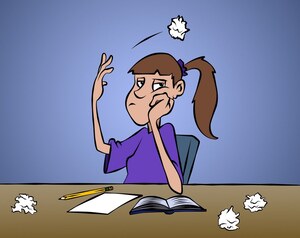 What I’m talking about is the book that should never have been written in the first place. The “it seemed like a good idea at the time” books that had no chance of ever making it to a satisfactory ending. These are the books filled with characters that are so badly written that to describe them as one dimensional is to ascribe one dimension too many. The books so lacking in emotion that you would think that the world was filled with emotionless robots rather than with real people. It is the latter which bothers me the most. Readers engage with characters they care about. They will want to read about them. They will want to turn the page to find out if they succeed or fail, love or lose, live or die. Readers care about them because they can identify with them and they identify with them because they understand them. So why couldn’t I identify with any of the characters in these poor novels? Basically it was because the authors told me so little about the characters. Oh, we get plenty of physical descriptions, to be sure. I was also given plenty of plot to read about, some of which was inventive, but much of which had been done before. To make me want to read on, I needed something to care about, and wasn’t given it. I ended up questioning my reason for reading the books. Why should I care about these characters? I don’t know them; I feel nothing for them. 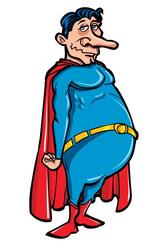 OK, they may be dangling above a fiery pit, just about to get burnt to a crisp, but do I care? Not really. The authors gave me no reason to care. They are just names on a bit of paper (or letters on the screen of an e-reader). They mean nothing to me because the authors haven’t told me anything about them to make me care. Like the guy on the left, they're just a caricature. When I think back over all the books I have ever read that I really enjoyed, the common factor is that they had strong protagonists. I don’t mean strong in the “wading through fire to rescue the damsel in distress” type of strong. I mean emotionally strong. Their authors made me feel every pang of emotion that you would expect a real person to feel. This is what worries me about the authors who are writing such poor books. Are they not people too? Do they not love? Do they not feel fear? Do they not feel happy or sad? To read their books you would think that the answer was a resounding “no”. If someone can’t write about emotions then I would suggest that they shouldn’t be an author, because to be an author you have to live with emotion every time you sit down to write. I don’t know about other authors, but when I stop writing at the end of the day I sometimes feel as though I’ve been through an emotional mangle; crushed and wrung out. If I can’t make myself laugh or cry then how am I ever going to make my readers laugh or cry? If I can’t make myself worry about what will happen to my characters, how can I expect my readers to worry about them?  Another problem that I have encountered in recent books is a lack of drama. Drama comes from conflict and if there isn’t any conflict in the story there will never be a story worth reading. Even romantic stories have a conflict at their heart. It is the conflict that prevents the romantically entwined characters from being happy together, at least not until they have resolved the conflict so that they can live happily ever after. This means that the characters must have something meaningful happen to them early in the story. Something that will expose their emotional state and tell me who they are, deep down inside. I have to say that some of the books I refer to have garnered 5 star reviews on Amazon and Goodreads, which is rather worrying. Either the readers who posted those reviews are less critical than me, or the reviews aren’t genuine. I am well aware that not every reader will enjoy every book to the same degree. One person’s 5 star read may be another reader’s 4 or even 3 star. But I can’t believe that 20 or 30 people gave 5 stars to the book I would struggle to award 1 star. It defies logic. I think the problem for some authors is the market testing of their books. They ask friends or family to read them, rather than asking for criticism from somebody independent. However well-read friends and family may be, at heart they want to be seen to be supportive of the author, so they say nice things about the book even if it hasn’t got many redeeming features. Consequently, the author gets a false sense of the real quality of their work and they publish based on that. They may get away with it once and sell a few copies, but no one will be returning to read the sequel. In the meantime, if you have written a book that you think is better than the ones I have talked about above, I’d be happy to review it for you. I really, really would like to be able to post a 4 or 5 star review for someone. And if you think I’m an arrogant know-it-all who wouldn’t recognise a good book if it jumped up and bit me on the nose, then you can say as much when you read one of my books and post a review of it. You can find out more about my books by clicking on the “Books” tab at the top of this page. If you have enjoyed this blog, or found it informative, then be sure not to miss the next edition. Sign up for our newsletter by clicking the button below. We'll even send you a free ebook if you do.
1 Comment
 How long should a book be if the author wants it to sell? I had better state up front that I’m not going to attempt to actually provide a definitive answer to the question I have posed. I’m entering into what might be regarded as a philosophical discussion on the subject and any views I express are merely opinions. But it is quite an important question because the answers, right or wrong, may strongly influence whether or not a reader actually purchases a book. If you use Google to try to find the answer you’ll get various opinions. But, generally, a novel is expected to be between 80,000 and 120,000 words. This is based on hard copy books, of course. Less than 80,000 words and it’s going to look pretty malnourished sitting on the bookshelf in W H Smiths (or Barnes and Noble) alongside its fatter neighbours. Size gives an impression of value for money, even if it is no guarantee of quality of writing. 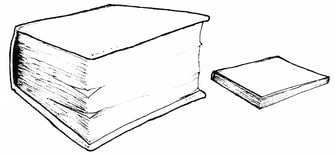 Once you get over 120,000 words, however, the publisher has a different problem. Paper costs money and profits will be reduced if publishers have to spend more money on paper but still have to charge the same price for the book in order to remain competitive. Most books sell at the same retail price regardless of size; about £18.99 (call it $20) for a hardback book and £9.99 for a paperback. Those prices are for bestselling authors, of course. Kindle books can run from 99p right through to marginally less than the price of a paperback, depending on how famous the author is. There is also a psychological factor. A thick book looks challenging. Maybe it’s so thick because the author has used a lot of big words. Maybe it will take too long to read and I’ll get bored with it. Maybe it’s so long because it’s very complex and I don’t want to spend a lot of time unravelling a complicated plot. Who knows what people might think when faced with a thick book!  While it would be nice to think that readers buy books solely based on the quality of the writing there has to be other factors involved. It can be the only explanation for some of the dross that makes it into best seller lists alongside much better written books and why some very good books never make it. For example, let’s say that a new author publishes their very first book. None of the reading public will ever have seen the author’s name before and can’t have read any of the author’s work, so how will they decide whether or not to buy the book? There is no doubt that marketing plays a big part in this. If the author is published by a major publishing house the publisher will put a lot of money into getting the name of the book out there in front of the reading public. Adverts have to be paid for; review copies have to be sent to newspapers, magazines, radio and TV stations etc. Authors are sent on book signing tours etc.  Best selling "author" Katie Price Best selling "author" Katie Price Based on the marketing blurb, readers may take a chance and shell out some of their hard earned, but in effect they are buying the publisher, not the book. And it works; Katie Price has sold a lot of very poor-quality books. Well, her ghost writers have anyway; she just gets the lion’s share of the royalties. But that doesn’t account for why some books released by smaller publishing houses, or even self-published books, also make it into best seller lists despite the minuscule amount of money spent on marketing them. The readers’ decision won’t be based on the quality of the author’s writing because, with a first book, they can’t have read any previous work on which to base that decision. It is also unlikely to be based solely on the few pages that Amazon allows the potential buyer to read using their “look inside” feature. As both a reader and an editor I know that a promising first few pages doesn’t necessarily lead to 300 good pages. Many authors, even quite well-established ones, are unable to maintain their writing quality for that long and some start to stumble after just 20 or 30 pages. By 50 pages I’ve already binned the book and gone looking for something better written.  Some Indie authors will already be aware of this phenomenon. Having submitted an extract as per an agent’s submission guidelines, they get a request for the full MS. They are elated, naturally, but then brought down to Earth with a bump when the full MS gets rejected. Learn from that – because what the agent is effectively saying is that you couldn’t maintain a consistent quality of writing for a full-length book. So, if the decision isn’t going to be based on the quality of the writing, what is it going to be based on? You would think that price might have something to do with the decision, but it doesn’t appear to do so. When it comes to the price of books we live in a strange world. A pint of beer costs around £4 and a large glass of wine (is there any other sort?) over £5. A self-published e-book, however, will retail for anywhere between 99p and £5 depending on the author’s knowledge of pricing strategies and their vanity. Now, which is going to last longer and offers more potential for enjoyment, the pint of beer/glass of wine or the book?  Well, let me put it this way. In my experience, after 6 months I find it easier to recall a good book (or even a bad book) than I do to recall the qualities of a specific pint of beer or a specific glass of wine. There is another factor involved here as well. If I really enjoy a book, I may go back a few months or years later and read the same book a second time. I’ve read Lord Of The Rings far more times than is healthy for a grown man. But I can’t go back and enjoy the same pint of beer or glass of wine again, not for free anyway – I have to buy another one and, thanks to inflation, it will cost more. So, if people won’t shell out the paltry sum of 99p to read an author’s first book what other factors are there? 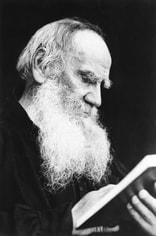 Leo Tolstoy Leo Tolstoy I go back to my argument about the word count. Is the reader truly getting value for money, or will they feel intimidated by the “thickness” of it? War and Peace is about 590,000 words long. When Tolstoy first had it published it was released in 4 volumes and a 2 part epilogue. If you want to buy a modern copy it would be more likely to be published as a single volume. In value for money terms you would think that it would be flying off the bookshelves, but it isn’t. Why not? It’s an acknowledged masterpiece after all. Well, perhaps people feel intimidated by its size. Let’s look at a more modestly sized classic, also by Tolstoy: Anna Karenina. Not many sales for that these days though it is perhaps one of the greatest romantic stories ever told. Length? 350,000 words. Hardly lightweight. Remember, I am also talking about e-books here, where you can’t “see” or feel the thickness of the book. 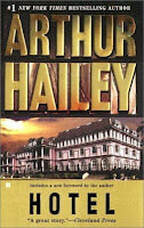 But you can. Because Amazon helpfully tells you, as part of their product description, how many pages long the book is As a guide, 80,000 words gives you a paperback book of about 290 pages, so 120,000 words would be about 435, big enough to qualify as a “blockbuster” in the Arthur Hailey mould. The sort of book that will not only last you for a whole holiday, but also for the cancellation of your flight due to a volcanic eruption and a 24 hour rail strike when you get back to the UK. The Kindle version of Arthur Hailey’s “Hotel” is actually 485 pages long. Perhaps that’s why he rarely features in the best seller lists any more. That and the fact that he died in 2004. 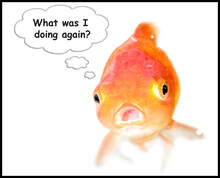 The sad truth is that the attention span of some readers isn’t that great. They’ll read 300 pages but 301 will defeat them. That presents the author with something of a problem. Do you disregard those readers and concentrate on those that will stay the course, in which case you are placing an artificial ceiling on your sales volume. Or do you take another course of action? Maybe you do what many authors are doing these days and write your books as a series; telling the story in 300 page chunks. You wouldn’t be the first: remember Tolstoy and War and Peace? It’s now common practice and one I have adopted for 2 separate series I have written. There can be no doubt that the margins for success for the new author are very narrow and seemingly quite arbitrary. It therefore makes sense, to me at least, not to do anything that might put the potential reader off buying a book and that includes thinking about exactly how long the book should be. Let’s face it, the average story could be told on a single page of A4, yet we expect a bit more than that. So the book should be neither too short (poor value for money) nor too long (too “weighty”). For me that means between 80 and 90,000 words. It’s entirely up to other authors where they draw their lines. If you have enjoyed this blog, or found it informative, be sure not to miss an edition by signing up for our newsletter. Just click the button below. And if you do - we'll send you a free ebook of your choice (from those we publish, not from the entirety of the publishing world). This week we have turned our blog page over to one of our authors - and a golfing nut - Robert Cubitt to take a lighter look at his favourite game. 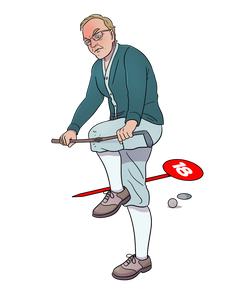 As a bit of relief from the seemingly endless politics and talk of war, this week’s blog is for the golfers amongst you, but I hope that non-golfers will also enjoy it. My thanks to all my fellow golfers who have unwittingly contributed to this page with their comments and jokes, on and off the golf course. Not all of them were meant to be funny, but so many of them were. A husband and wife, both golfers, were discussing the future when the wife said “If I died, would you marry again?” “Well, my dear, a man gets lonely so I might. But I could never find another like you,.” “You wouldn’t let her wear my clothes, would you?” “Of course not, my love." “You wouldn’t let here wear my jewellery, would you?” “Of course not, my dear.” “And you wouldn’t let her use my golf clubs would you?” “They’d be no good to her; she’s left handed.  They stood at the altar, waiting to be married. The bride-to-be looked down and saw a set of golf clubs beside her new husband's feet. "What on earth are you doing with those golf clubs?" she whispered. "Well," he said, "this won't take all afternoon will it?" I don't say my golf game is bad, but if I grew tomatoes, they'd come up sliced. I was playing so badly that I decided to throw my golf clubs in the lake – and missed. “How was your golf game?” “Oh. You know, hit and miss!” 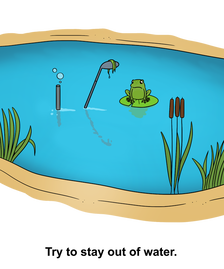 Golf, bloody golf! Golf is what you take up when sex becomes too demanding. Golf is the ultimate triumph of hope over expectation. Don't buy a putter until you've had a chance to throw it. Never try to keep more than 300 separate thoughts in your mind during your swing. When your shot has to carry over a water hazard, you can either hit one more club or two more balls. If you're afraid a full shot might reach the green while the foursome ahead of you is still putting out, you have two options: you can immediately shank a lay-up or you can wait until the green is clear and top a ball halfway there. No matter how bad you are playing, it is always possible to play worse 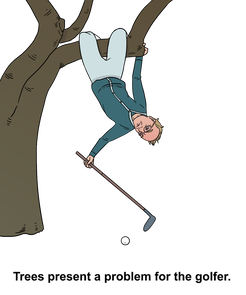 The less skilled the player, the more likely he is to share his ideas about the golf swing. The inevitable result of any golf lesson is the instant elimination of the one critical unconscious motion that allowed you to compensate for all of your many other faults. A golf match is a test of your skill against your opponents' luck. Counting on your opponent to inform you when he breaks a rule is like expecting him to make fun of his own haircut. The shortest distance between any two points on a golf course is a straight line that passes directly through the centre of a very large tree. You can hit a two acre fairway 10% of the time and a two inch branch 90% of the time.  If you really want to get better at golf, go back and take it up at a much earlier age. Since bad shots come in groups of three, a fourth bad shot is actually the beginning of the next group of three. The Pro's say you should take a divot the size, shape thickness of a dollar bill. Mine are the size, shape thickness of a rugby ball. When you look up, causing an awful shot, you will always look down again at exactly the moment when you ought to start watching the ball if you ever want to see it again. Every time a golfer makes a birdie, he must subsequently make two triple bogeys to restore the fundamental equilibrium of the universe. To calculate the speed of a player's downswing, multiply the speed of his back-swing by his handicap; ie. back-swing 20 mph, handicap 15, downswing = 300 mph. Hazards attract; fairways repel. If playing a "provisional ball" always results in a shot that is far better than the original, why don't golfers play their provisional ball first?  The ball you can see in the rough from 50 yards away is not yours. If there is a ball on the fringe and a ball in the bunker, your ball is the one in the bunker. If both balls are in the bunker, yours is the one in the footprint It's easier to get up at 6:00 a.m. to play golf than at 10:00 a.m. to mow the lawn. A good drive on the 18th hole has stopped many a golfer from giving up the game. Golf is the perfect thing to do on Sunday because you always end up having to pray a lot. Golf balls are like eggs. They're white. They're sold by the dozen. And you need to buy fresh ones each week. If your opponent has trouble remembering whether he shot a six or a seven, he probably shot an eight (or worse). It takes longer to learn to be a good golfer than it does to become a brain surgeon. On the other hand, you don't get to ride around on a golf cart, drink beer, eat hot dogs and fart if you are performing brain surgery. 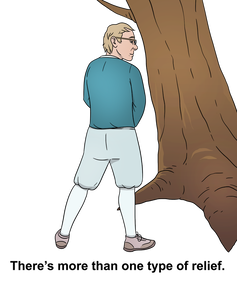 When practicing your putting on your living room carpet always remember that the ball will break towards furniture but away from walls. You have just missed a fairway that’s fifty yards wide, so what makes you think you’re going to be able to hit your ball through a gap in the trees that’s less than a yard wide? 10 Things in Golf That Sound Dirty...... 1. Look at the size of his putter. 2. Oh shit, my shaft’s all bent. 3. You really whacked the hell out of that sucker. 4. After 18 holes I can barely walk. 5. My hands are so sweaty I can't get a good grip. 6. Lift your head and spread your legs. 7. You have a nice stroke, but your follow through leaves a lot to be desired. 8. Just turn your back and drop it. 9. Hold up, I've got to wash my balls. 10. Damn, I missed the hole again. 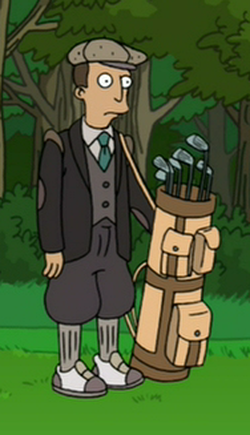 Caddies are the unsung heroes of golf. They have the golfing knowledge of an encyclopaedia, the patience of a Saint and the wit of Oscar Wilde. Golfer: "I think I'm going to drown myself in the lake." Caddy: "Do you think you can keep your head down that long?" Golfer: "I'd move heaven and earth to break 100 on this course." Caddy: "Try heaven, you've already moved most of the earth." Golfer: "Do you think my game is improving?" Caddy: "Yes sir, you miss the ball much closer now." Golfer: "Do you think I can get there with a 5 iron?" Caddy: "Eventually." Golfer: "You've got to be the worst caddy in the world." Caddy: "I don't think so sir. That would be too much of a coincidence."  Golfer: "Please stop checking your watch all the time. It's too much of a distraction." Caddy: "It's not a watch - it's a compass." Golfer: "How do you like my game?" Caddy: "Very good sir, but personally, I prefer golf." Golfer: "Do you think it's a sin to play on Sunday? Caddy: "The way you play, sir, it's a sin on any day." Golfer: "This is the worst course I've ever played on." Caddy: "This isn't the golf course. We left that an hour ago." 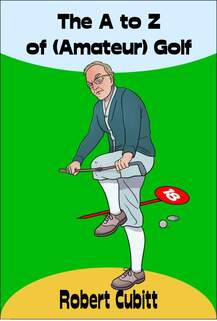 Golfer: "That can't be my ball, it's too old." Caddy: "It's been a long time since we teed off, sir." Golfer: “I don’t think my game could get any worse.” Caddy: “Give it time, sir, give it time.” Golfer: “Can you give me any suggestions?” Caddy: “Have you considered taking up fishing?” Robert Cubitt has taken another irreverent look into the golfing world with his book “The A To Z Of (Amateur) Golf" and some of the illustrations from that book have been included in this blog. To find out more about the book, just click on the cover image. If you have enjoyed this blog and want to be sure not to miss the next edition, why not sign-up to our newsletter? We promise not to spam you and we'll even give you a free ebook for signing up. Just click the button below. Once again we are featuring blogs by guest bloggers on a wide range of subjects related to reading and writing. All the opinions expressed are those of the blogger and are not endorsed by Selfishgenie Publishing. Enjoy! 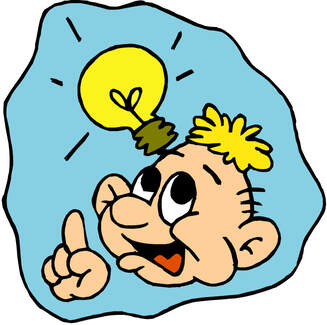 One of the questions most writers get asked is “where do you get your ideas from?”. While it’s a predictable enough question, It’s also one that’s easily answered. Ideas are all around us, we just have to look and listen and then let our imaginations take over. One of my earlier books was “The Girl I Left Behind Me”. The title came first. It’s the last line of the chorus to a traditional song and was used in the soundtrack of three John Ford westerns about the US Cavalry, titled Fort Apache, She Wore A Yellow Ribbon and Rio Grande. For some reason the tune popped into my head one day and I couldn’t shift it. But then it occurred to me that it would make a great title for a book. I quickly Googled it to make sure no one else had had the same idea (they appeared not to have) and then put it into my list of book ideas and let it ferment for a few weeks.  It’s the fermentation that is important here. I had a title but no idea what to do with it, so I let my unconscious mind work on it. I also looked up the origins of the song and found that it was traditional, probably 17th or 18th century British or Irish and had been popular with both sides during the American Civil War. Its rhythm makes it very suitable as a marching song which is why it has come down to us via a military route. Letting that information ferment alongside the title eventually gave me the idea of writing a story set in modern times about two young men who are born just a few streets apart but who go off to war to fight on opposite sides and who leave their "girls" behind them. The story is as much about the two women as it is about the men. I won’t give any more away, just in case you want to read it, but I’m sure you can see that once I had the basics mapped out, writing the story became something that was achievable. Not only that, but one of the characters I created for the book went on to feature in a sequel. 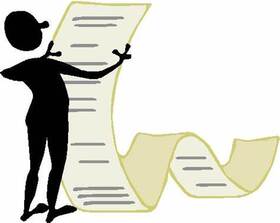 I have an ever-lengthening list of ideas for books that may, or may not, eventually see the light of day and they have come to me by a number of routes. They say that everyone has a book inside of them. American author Jodi Picoult added the rider “the problem is winkling it out” while British writer Christopher Hitchens is credited with adding “and that’s where it should stay”. But it is true. Everyone has a story that can be told, even if they aren’t able to tell it themselves. The problem Hitchens alludes to is making the story interesting enough to make people want to read it, which is the author’s job. For the author the only task in relation to coming up with new book ideas is to keep their eyes and ears open and the story ideas will come. At the moment I’m helping a fellow aspiring author by providing feedback on a book she is writing. I can’t give away the subject as that would be a breach of confidence, but the idea for it is straight off the front pages of the daily newspapers. She was so touched by what she was reading that the idea of not writing a story about it was probably more bizarre than the idea of writing it.  Does that mean that anyone can write a book? Technically yes. If you can write your name you can write a book. However, there is no doubt that some people have an aptitude for it and some don’t. Thanks to the capability to self-publish books that’s available through the digital revolution there are many books that I’ve read in recent years that really shouldn’t have been written, at least not by the people that wrote them. They are living proof of Christopher Hitchens’ corollary. But that doesn’t mean that someone with more aptitude couldn’t write a very good book using the same plot and characters. Do all my ideas become books? Most certainly not. The length of a novel may vary, but generally falls between 80,000 and 120,000 words. I have taken some ideas and barely made it to 10,000 words before I’ve run out of steam. That tells me that, for me, the story just hasn’t got any legs and there’s no point in wasting any more time with it. Of course I don’t delete it. I may have some sudden inspiration that will take it off in a completely new direction, but for the time being it goes into the file marked “not quite as good an idea as I thought”. 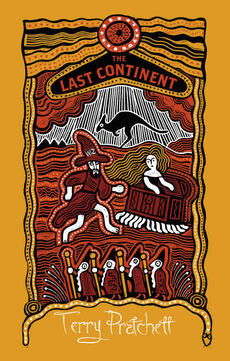 As for suggesting your own book ideas to authors, please don’t. It’s not that they aren’t good ideas, it’s that there are legal implications. Most big-name authors will tell you that at some point they have received letters or emails claiming that the idea for a book was stolen because they (the letter writer) once said or wrote down some of the words that are used in the book. The writer of the letter or email then goes on to try to claim money for suggesting the idea or, even worse, for plagiarism. Terry Pratchett’s agent told me that he received an email threatening legal action from someone who had once suggested, in another email, that Terry Pratchett set one of his books in Australia. The threatening email arrived shortly after the publication of The Last Continent in 2008, where Pratchett sets the story in the country of Fourecks on his imaginary Discworld. Fourecks bore a passing resemblance to the country we call Australia. That was enough for the loony who wrote the email. And that’s why authors would prefer it if you didn’t suggest ideas for books. It’s nothing personal. By the way, if that has given you an idea for making some easy money - forget it! Lawyers are expensive, they are happy to take your case because, win or lose, they will still get paid and proving plagiarism is a very difficult thing to do. If you don't believe me, just ask Sami Okri. So I took my idea that I had pitched to Terry Pratchett’s agent and wrote the book myself. It’s called The Inconvenience Store and is available (here comes the plug) on Amazon. 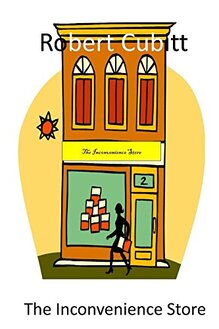 How did I come up with the idea? Easy. I had just been to a convenience store to buy something that they didn’t have on their shelves. When I asked the manager why they didn’t sell it (it was a common enough item) he told me that people often asked for that item, but they didn’t stock it because there was no demand for it. The manager was a totally irony free zone. My response to the manager about his store being more inconvenient than convenient gave me the title for my book and the rest, as they say, is history. So, where is your next book idea coming from? It could be closer than you think. Would you like to be a guest blogger for Selfishgenie Publishing? Just email us and tell us your idea for your blog. The email address can be found on our "Contact" page. If you enjoyed this blog, or found it interesting, be sure not to miss future posts by signing up for our newsletter. We'll even send you a free ebook if you do. Just click the button below.
|
AuthorThis blog is compiled and curated by the Selfishgenie publishing team. Archives
June 2025
|
 RSS Feed
RSS Feed